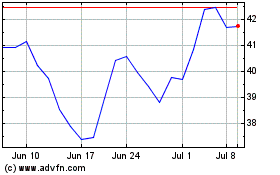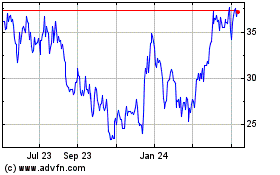Alcoa Requests Exemption from Aluminum Tariff
August 06 2018 - 5:02PM
Dow Jones News
By Bob Tita
The largest U.S. aluminum maker wants an exemption from tariffs
designed to bolster domestic metal production.
Alcoa Corp. on Monday asked the Trump administration for an
exemption from tariffs on aluminum imported from Canada, where the
company makes a raw form of the metal that it rolls into sheet for
beverage cans at a U.S. plant.
Some smelting lines have since restarted in the U.S. since the
Trump administration imposed a 10% duty on imported aluminum in
March. But Pittsburgh-based Alcoa said it can't find enough
specialty aluminum alloys for beverage cans in the U.S.
"Even if all the curtailed smelting capacity in the U.S. was
back online and producing metal, the United States would still need
to import the majority of its aluminum," said Tim Reyes, president
of Alcoa's aluminum business.
Alcoa operates three smelting plants in Canada that supply Alcoa
operations and customers in the U.S.
U.S. companies have filed thousands of tariff-exclusion requests
since the tariffs on steel and aluminum began this spring. Most use
specialized metals or components that aren't readily available in
the U.S. The aluminum tariff has snarled production of aluminum
parts and products in recent months because most of the aluminum
consumed by U.S. manufacturers is imported or remelted scrap.
Raw aluminum production in the U.S. has fallen for years as
rising electricity costs and aging equipment made U.S.-based
smelters less competitive with new smelters in other countries.
Aluminum prices have risen as buyers began to anticipate the
implementation of tariffs. Aloca said it still can't justify the
investment that would be necessary to restart some of its idle
smelters in the U.S.
Alcoa is the largest producer of raw aluminum in the U.S., but
the U.S. accounted for only 14% of the aluminum Alcoa produced
globally last year. The company wants the Commerce Department to
grant tariff relief on 40,000 metric tons a year of specialized
alloys that Alcoa uses to make aluminum sheet for cans.
The alloys are cast in 2-foot thick slabs at an Alcoa smelting
plant in Baie-Comeau, Quebec, and rolled into aluminum sheet for
cans at an Alcoa plant in Warrick, Ind. Alcoa's problem stems from
a shortage of casting capacity at Warrick and Alcoa's other U.S.
plants. In its exemption application, Alcoa said it had tried
unsuccessfully to buy more aluminum slabs from Century Aluminum
Co., the only other smelter operator in the U.S.
"Century Aluminum has indicated that it does not have the molds
to produce 24-inch thick slabs," Alcoa said. "There are no other
U.S. manufacturers currently capable of supplying the exact slabs
meeting Alcoa's specifications or an acceptable substitute."
The Commerce Department has 90 days to respond to have Alcoa's
exclusion request.
Alcoa said the tariff is increasing its costs, even as it
benefits from higher aluminum prices. The company predicted last
month that the tariff will increase its monthly costs by $12
million to $14 million for as long as the duty remains in place.
The company reported that the tariffs helped to raise its average
realized price on raw aluminum by 19% during the second quarter
from the year before.
Alcoa in July cut its profit outlook for the year, citing
increased expenses caused by the tariff. Alcoa CEO Roy Harvey said
overproduction of aluminum in China had created a global glut that
drove down prices. Mr. Harvey has urged the Trump administration to
negotiate with China to curb production as an alternative to a U.S.
tariff on all imported aluminum.
Write to Bob Tita at robert.tita@wsj.com
(END) Dow Jones Newswires
August 06, 2018 16:47 ET (20:47 GMT)
Copyright (c) 2018 Dow Jones & Company, Inc.
Alcoa (NYSE:AA)
Historical Stock Chart
From Mar 2024 to Apr 2024

Alcoa (NYSE:AA)
Historical Stock Chart
From Apr 2023 to Apr 2024
